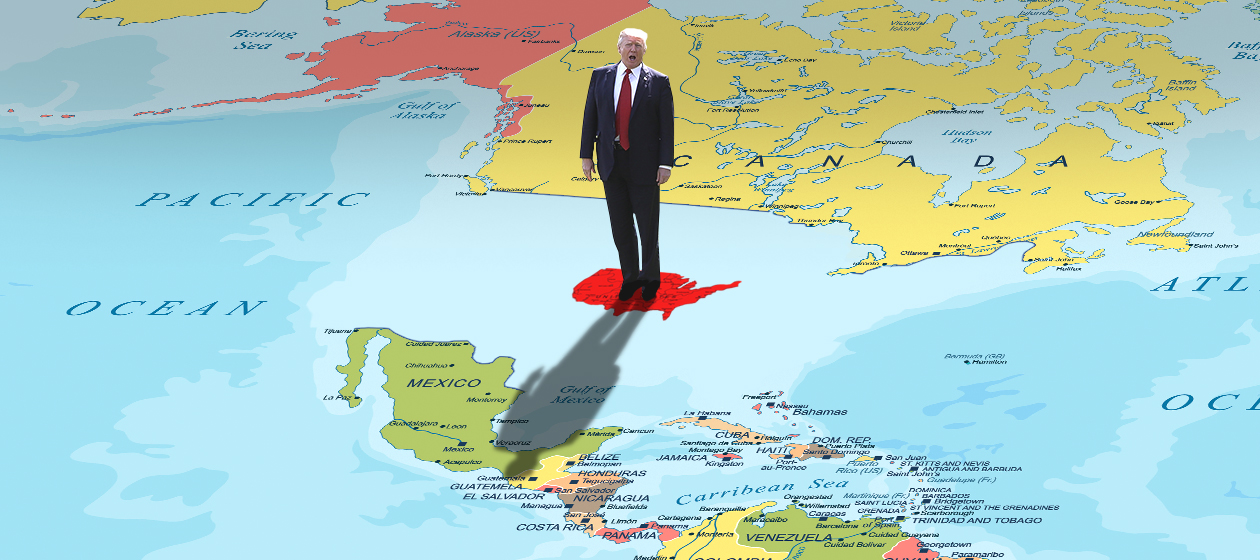Trump's America: Smaller, meaner, and increasingly unexceptional
How Trump put kids into cages and shattered the country's self-image


A free daily email with the biggest news stories of the day – and the best features from TheWeek.com
You are now subscribed
Your newsletter sign-up was successful
The Trump administration believes the laws of human decency do not apply to it.
In a profound break with the nation's ideals, the White House has made it the policy of the U.S. government to deliberately break up families seeking refuge at the southern border. This has led to the horrific practice of government-sanctioned kidnapping of over 2,000 children who have been taken from their parents and warehoused alone in detention centers, crying out for their families.
In the face of an international outcry, the president doubled down, arguing that these children must bear the brunt of his xenophobic crusade against an onslaught of Mexican rapists and criminals. "They could be murderers and thieves and so much else," Trump claimed once again. "We want a safe country, and it starts with the borders, and that's the way it is."
The Week
Escape your echo chamber. Get the facts behind the news, plus analysis from multiple perspectives.

Sign up for The Week's Free Newsletters
From our morning news briefing to a weekly Good News Newsletter, get the best of The Week delivered directly to your inbox.
From our morning news briefing to a weekly Good News Newsletter, get the best of The Week delivered directly to your inbox.
Yes, "that's the way it is" in Trump's America — a sign of how far the United States has fallen under his administration. For a country that has always thought of itself as exceptional, Trump has reshaped it into a moral mediocrity.
The notion of "American exceptionalism" has been a powerful force in U.S. politics for the better part of 200 years. It's an idea that has been repurposed to suit different ideological projects, but it generally stands for the belief that America should be a beacon of liberty and democracy across the world.
At a glance, Trump's flag-hugging jingoism would seem to fit this mold. His movement's various maxims — "Make America Great Again," "AMERICA FIRST!," and the latest and crudest, "We're America, Bitch" — all vow to restore the country to a supposedly bygone era of dominance and glory.
But a big part of what made America truly exceptional was its tradition of serving as a sanctuary for the world's downtrodden and oppressed. The United States has had its fair share of anti-immigrant politics, but at its best, the country promises to take in those ravaged by war, poverty, and violence and forge a community defined not by ethnic heritage or birthplace, but by a commitment to common values.
A free daily email with the biggest news stories of the day – and the best features from TheWeek.com
That's the type of exceptionalism that Trump's predecessor espoused. In one of the best speeches of his presidency, delivered in 2015 at the foot of the Edmund Pettus Bridge in Selma, Alabama, Barack Obama argued that American exceptionalism was a spirit and a state of mind. "We're the immigrants who stowed away on ships to reach these shores, the huddled masses yearning to breathe free — Holocaust survivors, Soviet defectors, the Lost Boys of Sudan," he proclaimed. "We are the hopeful strivers who cross the Rio Grande because they want their kids to know a better life."
Those hopeful strivers continue to cross the Rio Grande and elsewhere. It's the last leg of an often-perilous journey from home countries wracked by violence that their governments have been unwilling or unable to quell. It's a journey where many fall to the mercy of exploitative human traffickers to travel across a continent and through deserts.
Yet it's a journey that many continue to undertake to have a shot at a new life. And now, the U.S. government has taken to treating people arriving to seek asylum as if they themselves were criminals, poaching their children for good measure.
The Atlantic's Peter Beinart divides American exceptionalism into two poles: an exceptionalism recognizing that America has unique responsibilities and burdens on the world stage, and an exceptionalism claiming that America is entitled to special rights and freedom.
Most American political leaders lean toward one pole or the other, but ultimately strike a balance. But Trump is different. "What makes the Trump administration unusual," Beinart explains, "is that it is almost all 'rights exceptionalism' with virtually no 'responsibility exceptionalism.'"
But an exceptionalism that's all "rights" diminishes America by half. Obama, for instance, vigorously enforced immigration laws. But he also fundamentally believed that we draw strength from our responsibility to take in asylum-seekers and immigrants. Trump, on the other hand, takes a decidedly zero-sum, winner-take-all view of the world. To him, our global responsibilities are weaknesses to be shirked to the greatest extent possible by invoking America's "right" to do as it pleases.
Since his earliest days in office, Trump has had no qualms about rejecting those seeking refuge in the United States. And he confirmed this week that there's no place in his America for immigrants and refugees. "The United States will not be a migrant camp and it will not be a refugee holding facility," he declared. "Not on my watch."
A better, more generous America would welcome families fleeing oppression, rather than splitting them apart. But not on Trump's watch. For now, we have a president willing to use the specter of Central American street gangs as an easy boogeyman for political gain, but unwilling to offer shelter to the very people being terrorized by those gangs.
Hopefully someday the American government will better reflect the country's ideals again. But in the shameful shadow of kids in cages, the narrow zeal to Make America Great Again has succeeded only in making America a smaller, meaner, and increasingly unexceptional place.
Joel Dodge writes about politics, law, and domestic policy for The Week and at his blog. He is a member of the Boston University School of Law's class of 2014.
